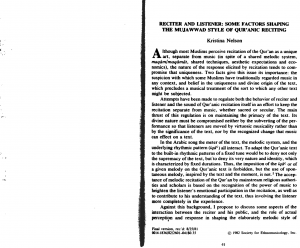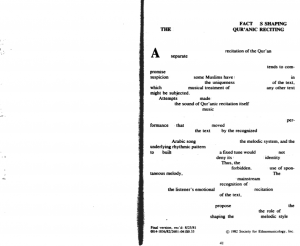How Esoteric Interpretations Can Go Wrong
May 7th, 2014
The cultural studies approach suggests an interdisciplinary and a multidisciplinary lens to studying the subject of Islam through experiences and narratives of individuals and cultures are taken into account. However, although this approach could help us overcome religious illiteracy and broaden our horizon of the term Islam to one that is inclusive in nature, there are several issues that may emerge while doing so, and some of this could be found in the debate on authority. With these changes in perspective, who would have the authority to interpret and guide the Muslim narrative, moreover, who would be eligible to do so. Several schools of thought are dominated by an exoteric understanding of the Qur’anic text, while other encourage the esoteric interpretations.
The Prophet Mohammad had emphasized reading the text while focusing on the quality rather than the quantity, as it is recorded in this narration: “One who has read the [entire] Quran in less than three days has not understood it.” Said the Prophet Mohammed. In focusing on the quality, he refers to engaging with the text on a metaphorical level too that would allow the reciter or reader to ponder and think deeper about a text. However, in doing so, one should also be cautious.
We have seen how difference punctuations in a text can change the entire meaning, and thus influencing the way people relate to it and share it. For example, one could say: “Woman, without her man, is nothing,” a presentation of women being inferior without the support or the guardianship of a man, while the meaning changes completely when one says: “Woman, without her, man is nothing” in which the opposite is somehow stated, declaring the nothingness of man, without the women.
Al-Ghazali states that although he is an advocate of esoteric and metaphorical interpretations, “metaphorical interpretation is necessary to overcome the contradiction between reason and text, while the mastery of exoteric interpretation comes before esoteric interpretation. ” and he proceeds by making recommendations for metaphorical interpretations:
- You shouldn’t expect or aspire to know everything. Somethings God made hidden.
- Never deny your reason.
- Don’t specify an interpretation when the possibilities are in conflict for ‘Zann/doubt’ is dangerous.
- You don’t know the intention of God until it is stated. Refraining from interpretation is then safer.
In this entry, I have played with a text to try to read between its lines, and in that I have intentionally presented an entirely different reading of Kristina Nelson’s original writings on “Reciter and Listener: Some Factors Shaping the Mujawwad Style of Qur’anic Recitation.” This is only an artistic presentation that has the exaggeration intended, to illustrate how meaning could shift drastically when attempting to read between the lines without adequate preparation or knowledge in the field.


Leave a Reply